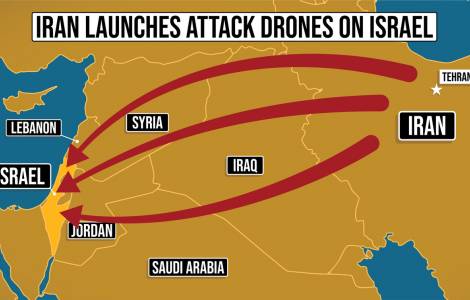
thehouseofdavid.org
by Gianni Valente
Jerusalem (Agenzia Fides) - "Since the renewed outbreak of violence in Israel-Palestine on October 7, 2023, the region has been overwhelmed by a series of tragic events that seem to defy rational analysis." Father Frans Bouwen, a Belgian priest of the Missionaries of Africa ("White Fathers"), has lived in Jerusalem for more than 50 years.
He is committed to ecumenical dialogue and directed the renowned magazine “Proche Orient Chrétien” for 46 years, from 1969 to 2015. This is also the reason why Father Bouwen is used to analyzing with clear realism the emergencies and shocks that pervade the geo-political scenario in the Middle East. The missionary of the "White Fathers" says in an interview with Fides: "The reasons for actions usually seem emotional or even passionate. Therefore, it is practically impossible to predict what will happen after the worrying acceleration caused by the Iranian attack between Saturday 13 and Sunday April 14".
The developments after the Iranian attack cannot be predicted. In fact, the secret services warned long in advance about the firing of drones and missiles into Israeli territory ...
FRANS BOUWEN: The Iranian response was indeed predictable after the significant Israeli attack on the Iranian consulate in Damascus, in which several senior Iranian officials were killed. In some ways, Iran felt compelled to retaliate after the many threats its leaders had made recently. In my opinion, it was primarily about protecting one's own reputation and saving face. In doing so, Iran in a way satisfied the most reactive part of its society and showed Israel that its threats must be taken seriously.
What are Iran's intentions for the future?
BOUWEN: Apparently Iran doesn't want to go any further. Much will depend on the reaction of Israel and Western states that express their support for Israel. This situation is seen by everyone as a wake-up call that requires quick, joint and decisive action.
What path should be taken to try to prevent the worst?
BOUWEN: Pope Francis said it well on Sunday 14th, after the Regina Caeli prayer. Above all, we must refrain from any action that could lead the Middle East into a new spiral of violence, that could plunge the entire region into a general war that would inevitably have serious repercussions on a global level. All interested states, in the Middle East and around the world, must agree to call for a cessation of hostilities and to engage in serious negotiations to find a solution to the underlying political and national conflicts and a stable situation for the entire Middle East.
What responsibility do other countries and international organizations bear in such a scenario?
BOUWEN: Negotiations of this kind cannot only take place between Israelis and Palestinians because the inequalities between the two parties involved are too great. Differences between the occupier and the occupied, between one of the most heavily armed countries in the world and a defenseless people. Western states bear a great responsibility in this matter, since, through their actions or inaction, they have allowed the situation to gradually develop into the impasse in which it finds itself today.
What are the realistic chances of finding a solution?
BOUWEN: Only such a peace conference can bring a solution. For those of us who live in these countries, the two possible solutions - two states for two peoples or a single state with equal rights and responsibilities for all - do not seem humanly feasible at the moment. But in the Holy Land there are many people on both sides of the conflict who are ready to live together and build a better world for all, starting with the grieving parents whose representatives were received by Pope Francis a few days ago.
From your residence in Jerusalem, which overlooks the "Via Dolorosa", what are the concrete signs of hope in the change you envision?
BOUWEN: Those of us who live near the Temple Mount and al-Aqsa Mosque were deeply impressed by the dignity and self-control of the tens of thousands of Muslim worshipers who came to prayer every day throughout Ramadan without causing any worthy incident of mention. This shows that the vast majority of Palestinians want to live in peace and be themselves, true to their identity and traditions. As a sign of solidarity with their brothers and sisters who are suffering from the violence in the Gaza Strip and parts of the West Bank, they gave up all major celebrations and limited themselves to praying and celebrating Ramadan with their families.
What about Christians?
BOUWEN: The Christian celebrations of Holy Week and Easter, according to the Gregorian calendar, took place in the same spirit of solidarity and sobriety and with a special religious fervor. At the Palm Sunday procession, Christians showed their desire to faithfully follow Jesus in his suffering, guided by their faith, which teaches them that this path leads to resurrection and victory over evil and death. It is the task of pastors to encourage believers in this “hope beyond hope” by recognizing, as St. Paul teaches in the Letter to the Romans: "And hope does not put us to shame, because God’s love has been poured out into our hearts through the Holy Spirit, who has been given to us" (Agenzia Fides, 15/4/2024).